10 Common Menopause Symptoms—And How to Deal With Them
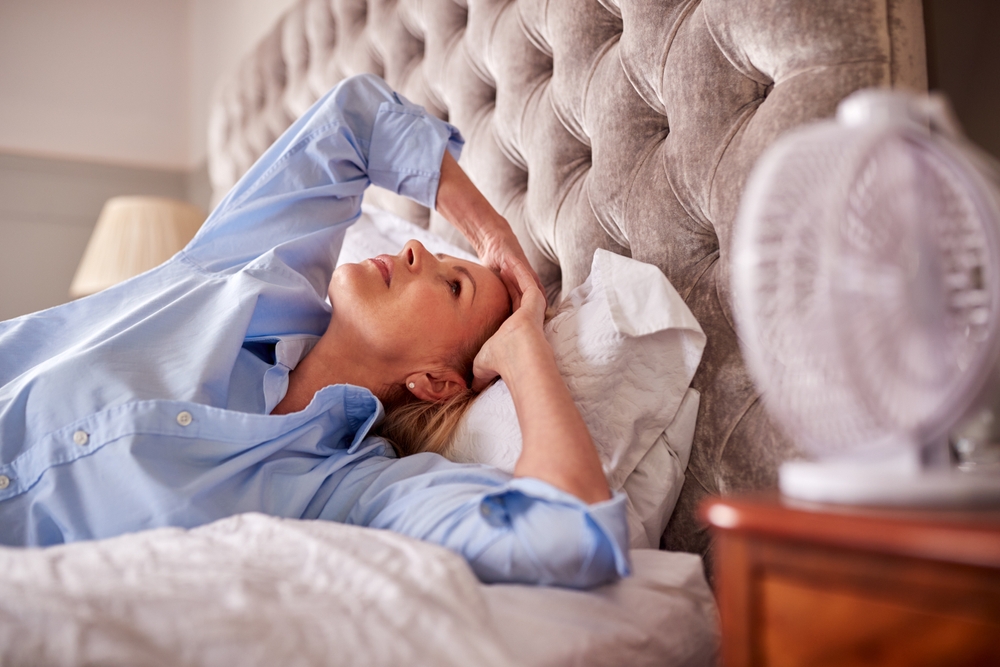
Menopause is a natural phase in every woman’s life, but it often comes with a variety of challenging symptoms. From hot flashes and night sweats to mood swings and poor sleep, these changes can certainly feel overwhelming!
Here, we’ll explore the 10 most common menopause symptoms, along with practical tips for each to help you navigate your menopause journey with confidence and ease.
1. Hot Flashes

Photo Credit: Shutterstock
Hot flashes are sudden, intense feelings of warmth that spread over the body. They occur thanks to fluctuating hormone levels (less estrogen), which affect the body’s temperature regulation. Hot flashes commonly start in the upper body and face and can spread over the whole body instantaneously.
You will notice a change in your body temperature, even feeling like your body is on fire.
How to Deal With Hot Flashes:
- Stay Cool: Wear lightweight clothing and keep your environment cool. Dress in layers so you can peel off a few if needed.
- Hydrate: Drink plenty of water to stay hydrated. Try these tips for drinking more water for inspiration!
- Diet & Lifestyle: Eating healthy and eliminating processed foods can help. Avoid spicy foods, caffeine, and alcohol which can trigger hot flashes.
- Relaxation Techniques: Practice deep breathing exercises at the onset of hot flashes. Also, for overall stress reduction try meditation.
- Cooling Necklaces: There are a variety of options that can help keep you cool.
2. Night Sweats
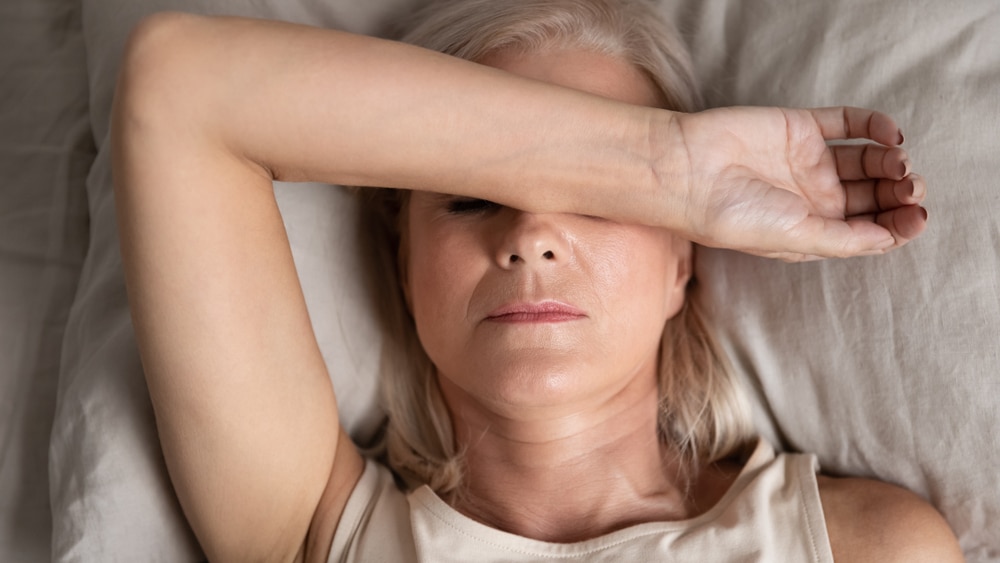
Photo Credit: Shutterstock
Night sweats are different from hot flashes. Think of them as hot flashes on steroids that occur during sleep and cause excessive sweating. Basically, you wake up, and your pajamas and sheets are soaking wet.
Again, hormonal fluctuations are the culprit here—particularly decreased estrogen levels, which interfere with the body’s heat regulation.
How To Deal With Night Sweats:
- Bedroom Environment: Keep your bedroom cool and well-ventilated, using a fan if needed.
- Light Bedding: Use lightweight blankets and moisture-wicking pajamas.
- Hydration: Drink plenty of fluids throughout the day.
3. Joint Pain

Photo Credit: Shutterstock
A decline in estrogen can cause inflammation, leading many women to experience menopause joint pain and stiffness.
This issue often goes undiagnosed, but it can be a real problem!
How To Deal With Menopause Joint Pain:
- Stay Active: Regular workouts and mobility exercises help keep joints flexible. Joints are where two bones come together, and consistent movement helps keep them naturally lubricated.
- Diet: Eat a healthy diet rich in anti-inflammatory foods like fatty fish, nuts, and leafy greens.
- Supplements: Consider Omega-3 supplements for joint health.
4. Mood Swings

Photo Credit: Shutterstock
Hormonal imbalances can impact brain chemicals that regulate mood. And if you are sleep deprived (another one of our ten common symptoms), your mood swings are worse.
Mood swings are sudden and intense changes in emotional state, often without any apparent reason. Think irritability, depression, and more anxiety than usual. One minute you are fine, the next you are sobbing at a sappy commercial.
You feel like you aren’t controlling your own emotions or mood changes.
How to Handle Mood Swings:
- Mindfulness & Meditation: Practice stress-relief techniques.
- Healthy Lifestyle: Regular exercise and balanced nutrition can stabilize mood. Make sure you are getting your vitamins and minerals and needed supplements.
- Social Support: Engage with friends, family, or support groups. If feelings become unbearable, please seek the help of a therapist or psychologist and your doctor.
5. Menopausal Weight Gain
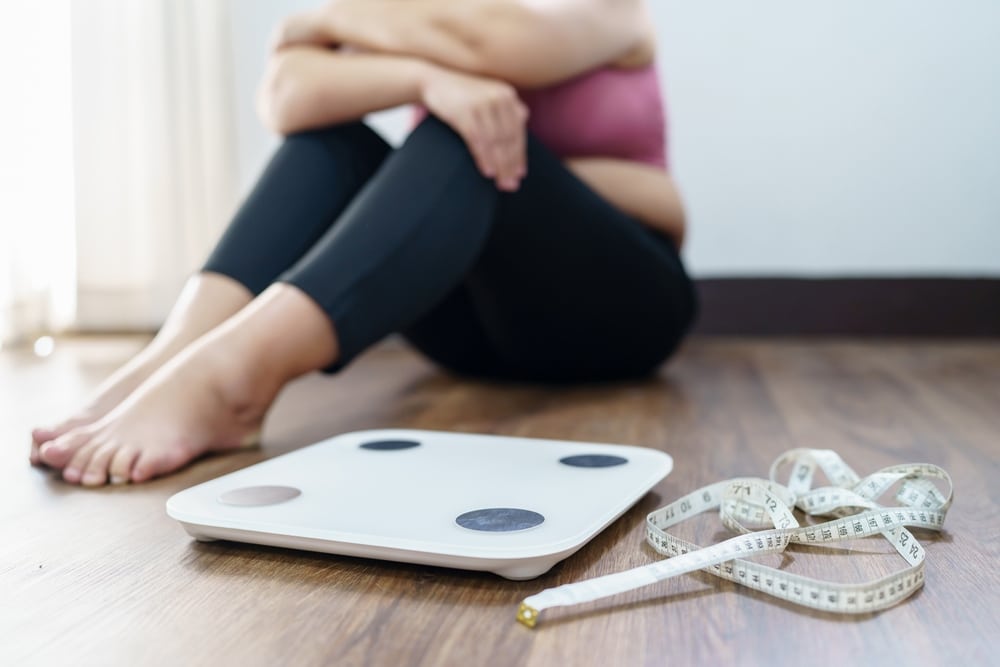
Photo Credit: Shutterstock
Menopause-related weight gain is incredibly common due to slowing metabolism and hormonal changes. Menopausal weight gain typically accumulates around the abdomen.
How to Handle Menopausal Weight Gain:
- Balanced Diet: Focus on whole foods and reduce processed foods. Eat more protein and fiber. Get rid of chemicals, fake food coloring and additives which cause inflammation.
- Regular Exercise: Incorporate both cardio workouts and strength training. If you are not strength training and you are over 50, now is the time! Muscle is the key to aging and staying strong and keeping your metabolism energized. (You can also check out the five benefits of HIIT exercise during menopause.)
- Portion Control: Be mindful of your portion sizes—calories do matter!
Check out more top tips for getting rid of menopause belly fat.
6. Poor Sleep
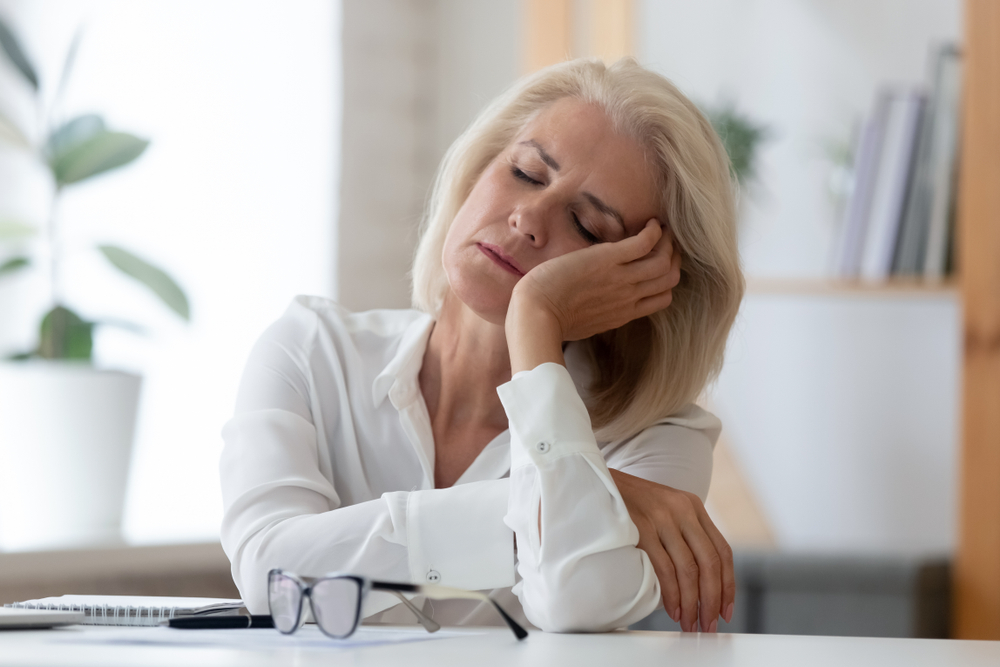
Photo Credit: Shutterstock
Hormonal changes can disrupt sleep patterns. Sleep problems can include difficulty falling asleep or staying asleep, often leading to overall fatigue.
How to Improve Poor Sleep:
- Sleep Routine: Establish a consistent sleep schedule. I had to get rid of my phone in bed!
- Caffeine Intake: Avoid caffeine. This was key for me was not having any after lunch.
- Sleeping Environment: Create a cool, dark, and quiet sleeping space.
- Supplements: There are many natural supplements that contain melatonin, magnesium, and other ingredients to help you fall and stay asleep.
If you’re struggling with a consistent nighttime routine, check out these science-backed tips for getting better sleep.
7. Brain Fog
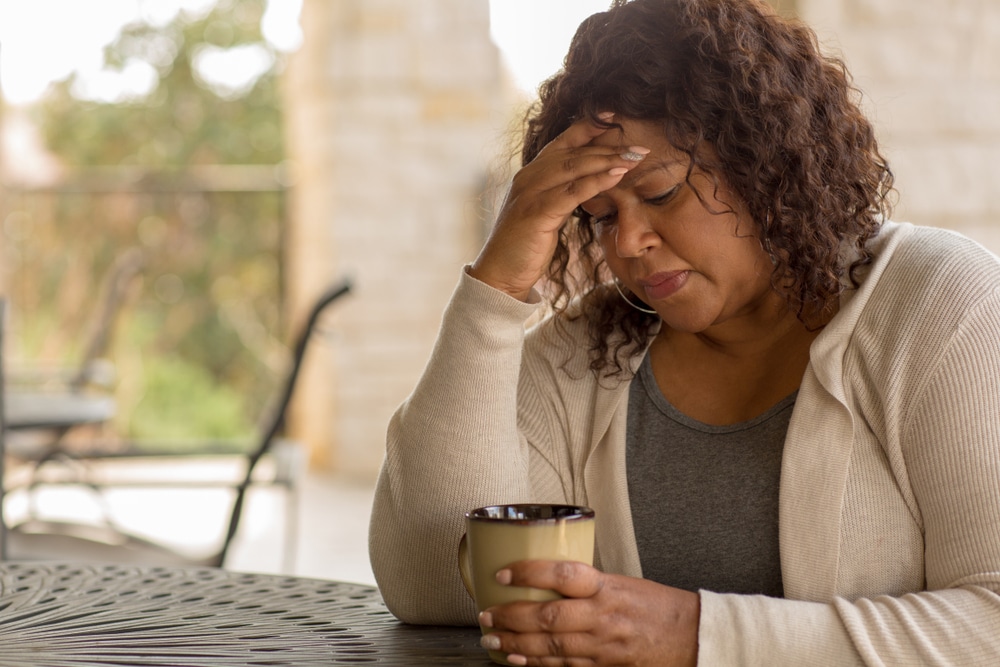
Photo Credit: Shutterstock
Hormonal shifts can affect cognitive function. As estrogen drops, your receptors may not be triggering well, and your lack of recall, concentration, and focus can worry you.
Many women experience brain fog as a common symptom of menopause. It’s recognized as forgetfulness or difficulty concentrating. It can also look like having a hard time remembering words or recalling what you just did or why you walked into a room.
How To Deal With Brain Fog:
- Mental Exercises: Engage in activities that challenge your brain. Play games, read daily, learn new things.
- Stay Organized: Use planners and reminders.
- Healthy Lifestyle: Maintain a balanced diet and regular physical activity.
- Stay Socially Connected: Connect with friends and family and try not to isolate yourself.
8. Loss of Libido

Photo Credit: Shutterstock
During menopause, many women experience a loss of libido or a decrease in sexual function.
All of a sudden, you may have a lack of interest in sex, vaginal dryness, and pain during sex. This is because lower estrogen levels can reduce blood flow to the genital area and decrease arousal.
How To Deal With Loss of Libido:
- Open Communication: Talk with your partner about your needs and concerns.
- Lubricants: Over-the-counter vaginal moisturizers and water-based lubricants can help alleviate vaginal dryness and discomfort during sex.
- Consult a Doctor: Seek advice on possible treatments.
This is a complex subject, and there are a few things you can do on your own, but reaching out to your healthcare provider to talk about your menopausal transition is encouraged.
9. Skin Changes
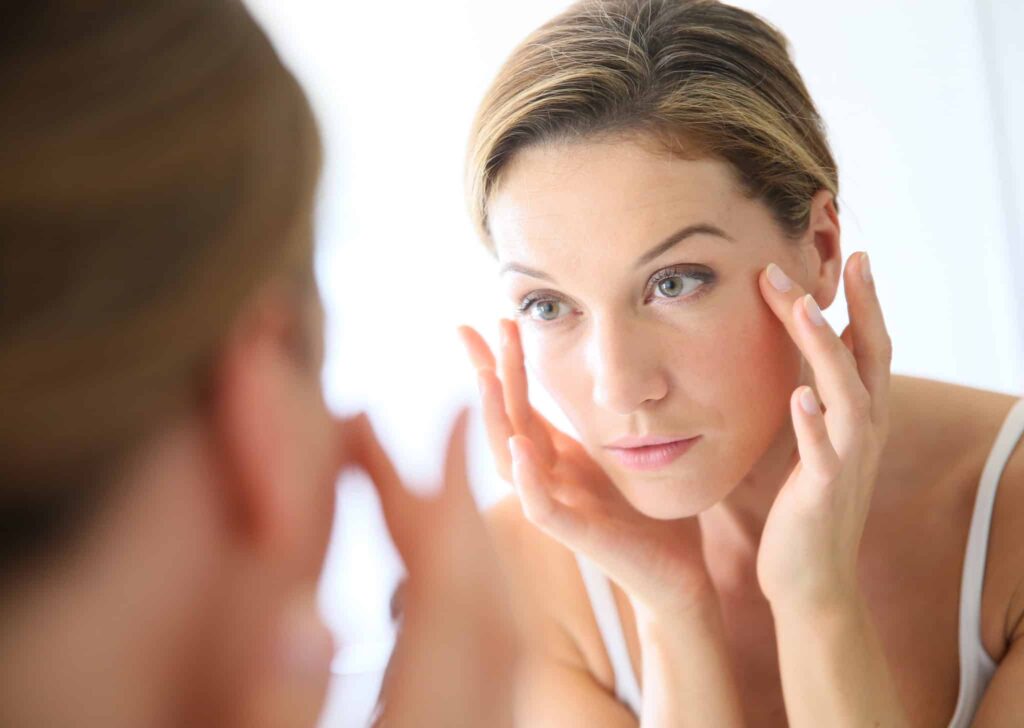
Photo Credit: Shutterstock
Many women experience noticeable changes in skin texture, coupled with the onset of wrinkles, dry patches, itchy skin, and slow wound healing. This one is a doozy.
Many women complain of crepey arms, legs, and necks in particular. Once again, the decline of estrogen is the culprit because it causes less blood flow to your skin. Menopause also brings on an accelerated loss of collagen and elastin.
How To Deal With Skin Changes:
- Diet and Supplements: Make sure to take adequate vitamin D. Collagen supplements can also be helpful.
- Topical Moisturizers: Use quality moisturizers with ingredients like hyaluronic acid to hydrate the skin. Use topical retinoids and Beta hydroxy acids to improve texture.
- Strength Train: You can’t eliminate crepey skin but by building muscle, it certainly looks better.
- Stay Hydrated: Drink plenty of fluids throughout the day.
- Skin Treatments: Talk to your dermatologist or a medispa about options to reach your skin goals.
- Lifestyle Changes: Wear a clean sunscreen. Wear UV protective clothing and avoid peak sun hours.
10. Migraine Headaches
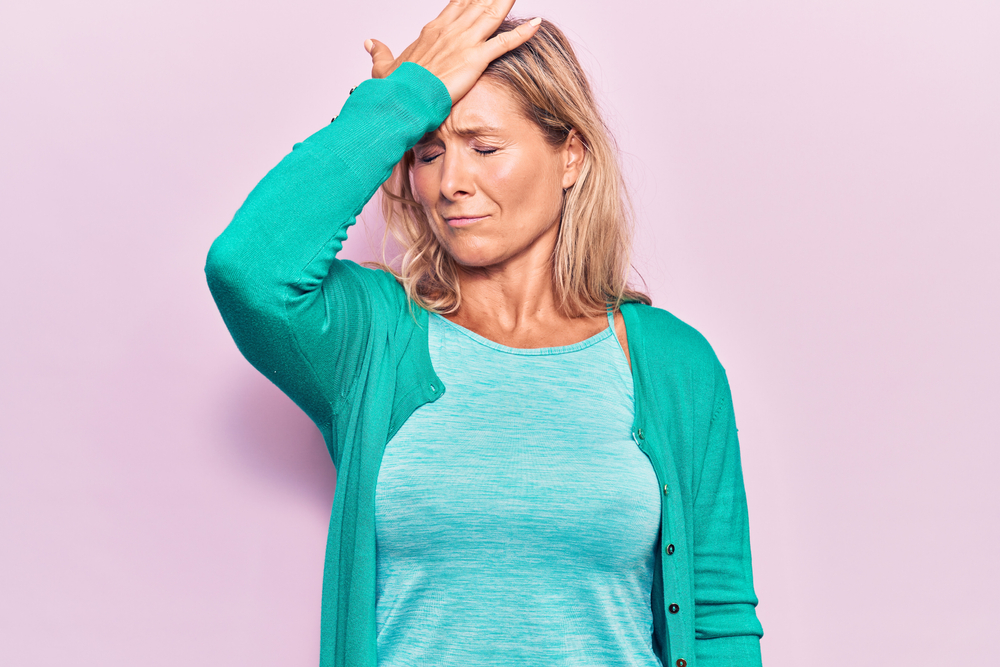
Photo Credit: Shutterstock
Migraines and headaches are very common during menopause. Many women experience frequent or severe headaches that may be new or worsening.
A migraine is a specific type of headache that is often characterized by throbbing pain on one side of the head.
How To Improve Menopausal Migraines or Headaches:
- Hydration: Drink plenty of water.
- Alcohol Intake: Reduce alcohol consumption.
- Over-the-Counter Pain Relief: Use medications like Advil or Excedrin as needed.
- Professional Advice: If headaches persist, consult a healthcare provider.
While these conditions and symptoms are common, everyone’s experience is unique. Always consult with your doctor to discuss any concerns or symptoms you may be experiencing that are impacting your quality of life.
Remember, you are not alone! With the right strategies, you can navigate menopause with confidence and grace.
